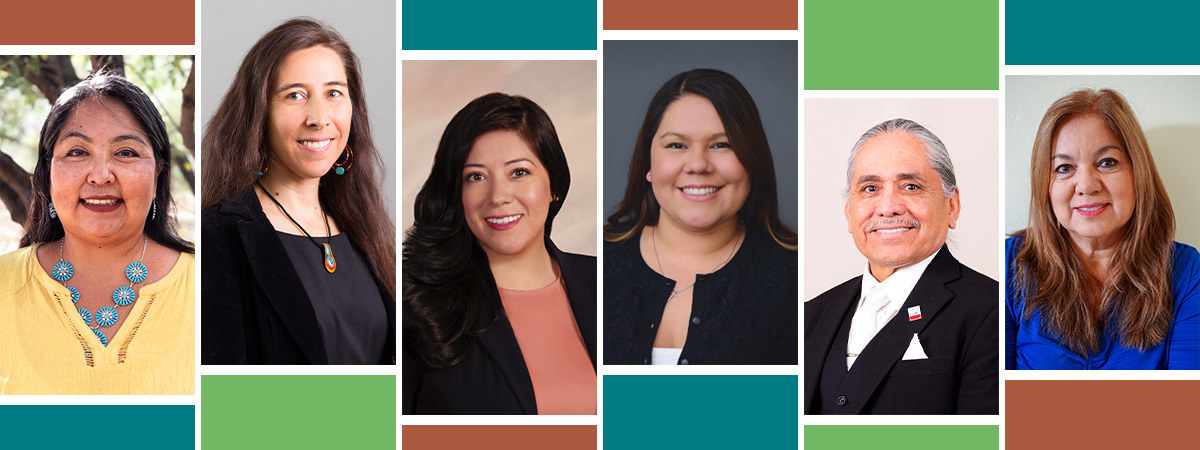
The Native American faculty team for our Certificate in Indigenous Health includes, from left to right: Agnes Attakai, MPA, Stephanie Russo Carroll, DrPH, MPH, Felina Cordova-Marks, DrPH, MPH, Tara Chico-Jarillo DrPH, MPH, John Ward Molina, MD, JD, LHD, and Silvia Parra.
Offered Online and On Campus in Tucson
Developed and implemented by public health experts with extensive experience of working with Indigenous populations locally and globally, the objective of the Graduate Certificate in Indigenous Health is to equip health professionals with skills and competencies that are necessary to engage in evidence-based public health practice at the leadership, management, and supervisory levels.
Who Should Attend?
Designed to be offered entirely online for the working professional, the primary targets of the Graduate Certificate in Indigenous Health are graduate students, physicians, nurses, social workers, psychologists, dentists, nutritionists, speech and language pathologists, health educators, physical therapists, occupational therapists, and other public health professionals. Participants can complete the certificate in as little as one academic year.
Admission Criteria Application Deadlines How to Apply
About the Program
Indigenous communities, peoples and nations are those which, having a historical continuity with pre-invasion and pre-colonial societies that developed on their territories, consider themselves distinct from other sectors of the societies now prevailing in those territories, or parts of them.[1]
There are approximately 300–500 million people across the globe who are variously identified as Indigenous, including about 5000 distinct groups in more than 70 countries.[2] Indigenous health examines health and wellbeing of Indigenous Peoples with emphasis on Indigenous models and frameworks that are rooted in culture, language, identity, place and community history. Indigenous communities in the United States and globally have disproportionately worse health outcomes than the general population. Resource constraints and the continual evolution of public health threats compound existing health inequity for these communities, and raise constant challenges to public health personnel. In spite of these unique challenges, there are few public health training programs that are specifically designed to increase the capacity of current and future public health workforce for Indigenous communities.
[1] Martinez Cobo, J. 1982. Study of the Problem of Discrimination Against Indigenous Populations Final Report. Available at https://www.un.org/development/desa/indigenouspeoples/publications/martinez-cobo-study.html [Last date accessed 9 March 2019].
[2] United Nations. 2009. State of the World’s Indigenous Peoples. Unknown. Available at https://www.un.org/esa/socdev/unpfii/documents/SOWIP/en/SOWIP_web.pdf [Last accessed 28 August 2018].

Program Faculty
- Agnes Attakai, MPA Navajo
- Stephanie Russo Carroll DrPH, MPH Ahtna
- Felina Cordova-Marks DrPH, MPH Hopi
- Tara Chico-Jarillo DrPH, MPH Tohono O’odham
- John Molina, MD, JD, LHD Pascua Yaqui
- Silvia Parra Tohono O’odham
Program Directors
Curriculum
The graduate Certificate in Indigenous Health consists of five required courses for a total of thirteen units.
Required Core Courses (13 units)
PHPM 517 Indigenous Public Health
3 units//Fall
Provides an overview of a broad range of public health topics through an Indigenous lens. During this course students will engage with current Indigenous public health topics. Among others, they will: analyze Indigenous epistemologies and methodologies as they relate to public health; appraise the relationships among Indigenous human health and the natural and spiritual worlds and how they interact with environmental health issues, and evaluate the role of Indigenous epidemiology, statistics, evaluation, and data governance in advancing the health of Indigenous communities.
PHP 521 Administrative Dimensions of Indigenous Health
3 units//Spring
Upon completion of this course, participants should be able to: analyze the historical and legislative foundation of the Indian Health Service; evaluate the value of innovative administrative strategies to improve health within the Indian Health Service, assess and interpret knowledge to develop relevant and meaningful administrative and policy options to improve indigenous health.
PHPM 568 American Indian Health Care Policy
3 units//Fall
This course addresses access to care through the Indian Health Service, Tribal PL 93-638 contracts, Medicaid and Medicare. Participants should be able to describe the legal basis for Indian Health Services, appraise access to care for Native Americans, and evaluate the challenges in serving Urban Indian Communities.
HPS 556 Indigenous Methods and Evaluation Approaches
3 units//Spring
This course will equip participants with practical skills to conduct evaluation of public health programs using perspective methods influenced by indigenous ways of knowing, frameworks, and cultural paradigms.
*Note: In Spring 2023, this course will be offered as HPS 595 - Special Topics
HPS 597B Maternal & Child Health Programs in the Rural Southwest
1 unit//Summer
This course is a one-week field-based course for MCH students in order to provide culturally competent knowledge and skills for working with Native American and border communities in the rural Southwest. Eliminating health disparities and barriers among minority populations requires awareness and understanding of their diverse social, cultural and health practices. This course provides MCH students with an opportunity to learn about different tribal and border health service provision models and approaches and the implications of these health care systems on health status.

Time Commitment
The Indigenous Health graduate certificate was developed to meet the needs of busy professionals, and all courses can be completed online in one to two years.
Learning Objectives
Upon completion of the certificate, students should be able to:
- Analyze Indigenous epistemologies and methodologies as they relate to public health.
- Evaluate the value of innovative administrative strategies to improve health within the Indian Health Service.
- Appraise different tribal and border health service provision models and approaches and the implications of these health care systems on health status.
- Assess and interpret knowledge to develop relevant and meaningful administrative and policy options to improve indigenous health.
- Conduct evaluation of public health programs using evaluation frameworks and approaches that align with Indigenous ways of knowing, frameworks, and cultural paradigms
Additional Information
For more information contact the Graduate Certificate Coordinator: coph-certificate@arizona.edu







